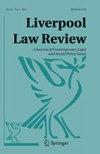体育仲裁中的人权:国际体育仲裁法庭应如何保护体育人权?
IF 0.3
Q3 LAW
引用次数: 0
摘要
体育管理机构制定自己的体育规章制度。然而,他们面临着一个复杂的问题,即天生具有优势数量的睾丸激素的女运动员是否可以参加女子体育比赛。在卡斯特·塞门亚和南非田径协会(ASA)诉国际田联(IAAF)一案中,体育仲裁法庭(CAS)认为她不能参加女子体育赛事,因为“这些运动员的睾丸激素水平升高,可能会比其他没有46 XY DSD的女运动员产生不可逾越的优势”。因此,国际体育仲裁院裁定她将不再有资格参加职业女子比赛。在这个场景中,本文的主要重点是研究CAS应该如何处理与人权相关的问题,尽管它不是像欧洲人权法院(ECtHR)那样的人权法院,而是一个仲裁法庭。为达到这一目的,本文将探讨以下问题:(1)运动员如何向体育仲裁院申诉其人权受到侵犯?(2)国际体育仲裁院应采取哪些措施保障体育人权?通过本研究,有助于明确体育裁判所在体育人权保护中的作用。本文章由计算机程序翻译,如有差异,请以英文原文为准。
Human Rights in Sports Arbitration: What Should the Court of Arbitration for Sport do for Protecting Human Rights in Sports?
Abstract Sports governing bodies establish their sporting rules and regulations. Nevertheless, they confront a complex question concerning whether a female athlete who inherently possesses an advantageous quantity of testosterone may participate in female athletic competitions. In Caster Semenya and Athletics South Africa (ASA) v. IAAF , the Court of Arbitration for Sport (CAS) held that she could not participate in female sports events because “the elevated testosterone levels that such athletes possess can create an insuperable advantage over other female athletes who do not have a 46 XY DSD condition”. Consequently, the CAS ruled that she would no longer be eligible to compete in professional female competitions. In this scenario, the primary focus of this article is to examine how the CAS should address human rights-related issues, even though it is not a human rights court like the European Court of Human Rights (ECtHR) but rather an arbitral tribunal. To achieve this purpose, this article will address the following questions: (1) How can athletes claim a violation of their human rights before the CAS?; and (2) What steps should the CAS take to safeguard human rights in sports? Through this research, it may serve to identify the CAS’s role in human rights protection in sports.
求助全文
通过发布文献求助,成功后即可免费获取论文全文。
去求助
来源期刊

Liverpool Law Review
LAW-
CiteScore
1.40
自引率
10.00%
发文量
24
期刊介绍:
The Liverpool Law Review is a tri-annual journal of contemporary domestic, European and international legal and social policy issues. The Journal aims to provide articles, commentaries and reviews across a wide range of theoretical and practical legal and social policy matters - including public law, private law, civil and criminal justice, international law, ethics and legal theory. The Journal has many international subscribers and regularly publishes important contributions from the U.K. and abroad. Articles and commentaries are published with sufficient speed to ensure that they are truly current.
 求助内容:
求助内容: 应助结果提醒方式:
应助结果提醒方式:


